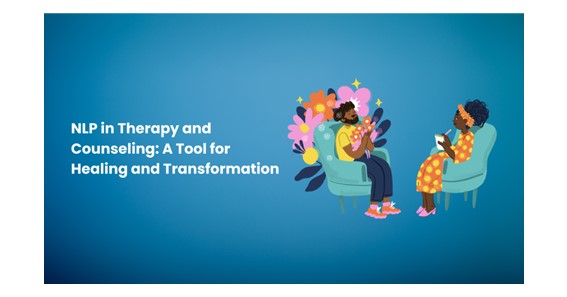Research in human psychology has led to major advances in treatment and counselling. Neurolinguistic Programming is a unique approach. Communication, behaviour, and personal development make NLP a powerful tool for healing and transformation in therapy and counselling. This article discusses Benefits of NLP and why having an NLP Certification may revolutionise a therapist’s career.
Table of contents
- NLP Therapeutic Benefits
- NLP Training’s Advantages for Therapists
- In summary
NLP Therapeutic Benefits
Neuro-Linguistic Programming (NLP) is a comprehensive method for understanding and changing people’s environmental perceptions and interactions. Fundamentally, NLP recognises the complicated link between words, thoughts, and actions. By addressing this connection, NLP-trained therapists and counsellors may help clients make permanent changes.
- Better Interaction: Strong therapy and counselling start with strong communication. NLP helps therapists understand language patterns and connect with patients. By matching language and communication to client preferences, therapists may quickly build rapport and trust and facilitate healing and change.
- Quick Behavioural Shift: One of NLP’s primary characteristics is its capacity to promote quick behavioural changes. NLP-trained therapists may assist clients in identifying and reframing limiting ideas and cognitive habits. Clients may quickly overcome phobias, anxieties, and other emotional hurdles using strategies like anchoring and reframing, which expedite therapeutic progress.
- Self-actualization and Self-Discovery Personal growth and self-awareness are highly valued in NLP. By using NLP approaches, therapists may assist their clients in discovering their inner resources and hidden potentials as they embark on a path of self-discovery. Empowering resilience and self-worth empowers clients to take charge of their lives and welcome good change.
- Customised Actions: Each customer is different, so what suits one may not suit another. Therapists may use a variety of methods and tactics from NLP’s toolset. Because of its adaptability, therapists may customise treatments to meet each client’s unique requirements and preferences, resulting in a more successful and individualised therapy relationship.
NLP Training’s Advantages for Therapists
After discussing the significant benefits of NLP in therapy and counselling, let’s examine why certification in NLP may be a game-changer for therapists.
- Increased Abilities: NLP-trained therapists have a broader skill set that enhances more conventional therapy modalities. It gives their practice a crucial new dimension that enables them to handle a larger variety of problems and assist customers in reaching their objectives more successfully.
- Competitive edge: In the competitive environment, therapists with an NLP certification stand out from their colleagues. They become more appealing to customers looking for cutting-edge therapy treatments since they show a dedication to lifelong learning and a readiness to adopt novel approaches.
- Enhanced Results for Clients: The goal of therapy for clients is to make improvements in their lives. NLP-trained therapists can work more quickly and effectively, increasing client satisfaction and generating favourable reviews. Happy customers are more inclined to recommend a therapist to others, which grows their clientele even more.
- Increased Compassion and Accord: A therapist with NLP training can better develop a rapport and strong client relationships. This increased capacity for empathy promotes a therapeutic alliance based on trust, often serving as the impetus for important therapeutic advancements.
- Individual Alignment: A person’s life is often transformed while earning their NLP certification. NLP training helps therapists understand themselves and their mental processes more deeply. This self-awareness may significantly impact Their personal and professional lives, which may also make them more skilled and sympathetic therapists.
- Wholesome Method: NLP advises therapists to use a comprehensive approach to treatment, considering the client’s larger life context and current difficulties. This all-encompassing viewpoint may result in more long-lasting and profound changes in clients’ lives.
- Flexibility: Because of their versatility, NLP approaches may be used in various therapeutic contexts. NLP training may supplement and strengthen a therapist’s current talents, regardless of their approach—cognitive-behavioural therapy, psychoanalysis, or anything else—and increase their adaptability to various client demands.
In summary
Neuro-linguistic programming, or NLP, has become a potent tool for healing and change in the therapeutic and counselling fields. Its emphasis on behaviour, communication, and personal growth enables therapists to assist clients in making quick and significant changes. Furthermore, earning an NLP certification may be a game-changer for therapists, providing advantages that boost their abilities, better client results, and promote personal development.
Regarding innovation and efficacy, NLP continues to lead the way in therapy and counselling. Therapists may change their personal and professional lives in addition to helping their clients by integrating NLP principles into their practice and obtaining NLP certification. Without a doubt, NLP is a powerful instrument for healing and change in the dynamic field of therapy and counselling that shouldn’t be disregarded.







